Table of Contents
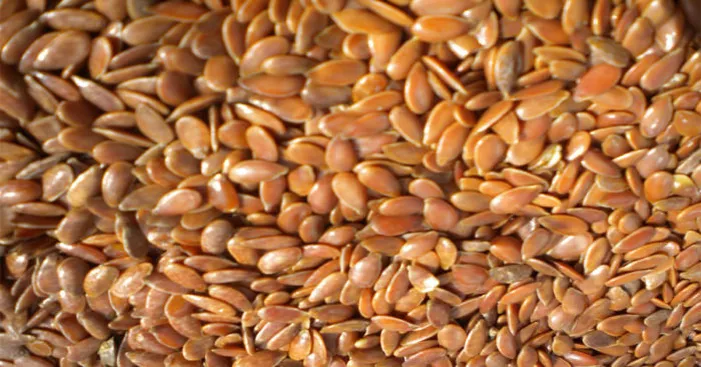
Flaxseed calories are actually more than what you think, they provide several health benefits but they can be too much!
In this article, you will discover everything you need to know about the flaxseeds, how to eat them, their nutritional value, health benefits, possible side effects, and tips on how to store them!
But first…
Meet flaxseeds:

These seeds grow on an annual plant that belongs to the Linaceae family which goes by the scientific name Linum usitatissimum.
This plant grows up to 1 to 3ft (0.3 to 0.9m) with branches that contain small green leaves and blue flowers.
Flaxseed flowers bloom between February and September and the whole plant takes only 120 days to fully mature.
After maturing and harvesting, the stems dry out in 4 weeks until the seeds are fully dry and ready for consumption.
As for the types, flaxseeds come in two main categories Brown and yellow (golden) which contain almost the same nutrients.
Among the most abundant nutrients in flaxseeds, it is one of the best sources of Alpha-linolenic acid and lignans.
Flaxseed calories:
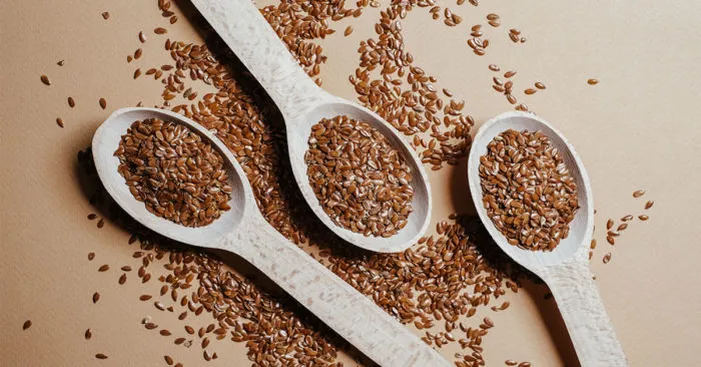
You may be wondering: “what are the benefits of flaxseeds that everyone speaks about?”
Flaxseeds are among the super seeds because they contain a lot of beneficial nutrients.
In fact, 1tbsp of flaxseed provides about 55 calories and that is less than 20% of the recommended calories in a meal.
However, the best part is even those few calories in 1tbsp of flaxseed contain good amounts of protein, carbs, vitamins, and minerals.
In order to control our weight, calculating the calories we consume is very important.
Whether we want to gain or lose weight, we should know how many calories we consume per day in each meal and snack.
In that same manner, we need to know how much flaxseed we can include in our diet.
This is because If we eat an excessive dose of flaxseeds + the daily food we consume, we are giving our body more calories than it needs.
In that case, the body stores the excess calories as fuel in the form of fat to use when it needs it.
However, the amount of calories needed daily differs from one person to the other based on many factors and we won’t explain that in this article.
As for flaxseed calories, they can be divided into three types based on the sources of the calories.
Its calories come from protein, carbohydrates, fibers, and fat.
Let’s delve deeper into each of them to understand flaxseed calories better:
Protein in flaxseed:
For the recommended serving of flaxseed of 1tbsp (10g), we find around 1.9g of plant-based protein.
Among the many amino acids that characterize flaxseed protein, it contains aspartic and glutamic acids.
Both of these acids play a key role in protecting the heart and enhancing the effectiveness of the immune system.
Carbs in flaxseed:
For the same daily serving of 10g of flaxseeds, there are 3g of carbohydrates which is only 1% of our daily need for carbs.
Thanks to that, flaxseeds are not among the food that significantly increases weight and can help lose few extra pounds.
Researchers showed the ability of these super seeds to reduce the risks of stroke and help patients who suffer from irregular blood pressure.
Nutritional value of flaxseed:
These are the nutritional data of 1tbsp (10g) of whole flaxseeds:
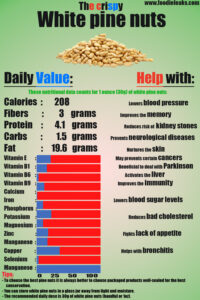
- Calories: 55
- Fat: 4.2g
- Protein: 1.8g
- Fibers: 2.7g
- Carbs: 0.35g
- Vitamin B1: 15%
- Vitamin E: 13%
- Calcium: 3%
- Copper: 12%
- Iron: 4%
- Magnesium: 11%
- Potassium: 3%
- Phosphorus: 10%
- Manganese:12%
Flaxseeds calories come from many useful nutrients such as dietary fibers which come in good amounts of up to 12% of our daily need in just 1tbsp.
Fibers can be a soluble fiber that stabilizes blood sugar levels, improves digestion, and reduces bad cholesterol.
The second type of fiber is insoluble and makes the largest part of flaxseed fibers.
Insoluble fiber lowers blood sugar levels and may prevent constipation by acting as a laxative to regulate bowel movements.
Also, that 1tbsp of flaxseed is 7% water and contains only 0.6% of our daily safe dose of sugar.
As for minerals, flaxseeds contain magnesium, molybdenum, phosphorus, copper…
Those minerals combined to provide great benefits for the bones and many other body functions.
In addition, flaxseeds contain many beneficial vitamins especially vitamin B1 (Thiamine) which stimulate our nervous and digestion systems.
Usage of flaxseeds:
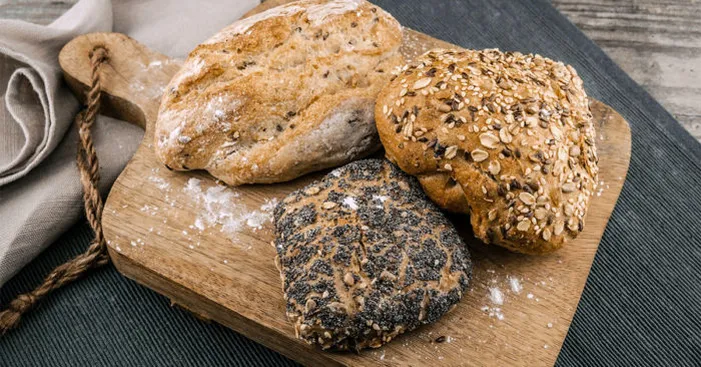
Most nutritionists recommend using flaxseed on a regular basis to obtain a balanced diet.
You can use them in many different ways, among them we mention:
In baking recipes: you can add flaxseeds to a cake, bread, cinnamon rolls, or cookies.
Milled flaxseeds can be a substitute for butter in some recipes, but you should know this may lead to faster cooking.
You can use flaxseed oil in sauces and salads but it cannot replace olive oil or corn oil as it burns faster.
Flaxseed can also replace eggs especially for vegans or allergic people.
To do that, put 1tbsp of milled flaxseed in 3tbsp of water and let them rest until they turn into a thick mixture form then use them just like you use eggs.
You can add 1 tbsp of flaxseed to your every day cereals.
You can add 1tbsp of milled flaxseed to mustard or mayonnaise and use it to make sandwiches.
You can add 1tbsp of milled flaxseed to yogurt.
The benefits of flaxseeds:
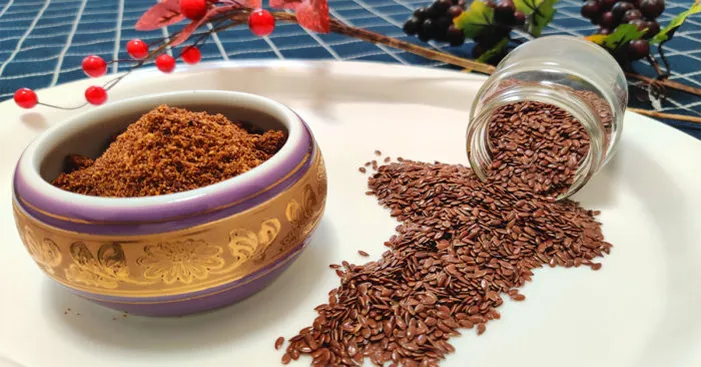
The first thing that comes to mind when you hear about flaxseed calories, is the many nutrients in these seeds.
Flaxseeds are a superfood and come with great health virtues among which we mention:
May protect against cancer:
Many scientific studies confirmed the benefits of flaxseeds in fighting and preventing cancer.
These seeds are a great source of chemical compounds called lignans.
These chemical plant-based substances are effective to prevent the spread of cancer.
In fact, many cancer therapies include the use of lignans in the treatment.
Reduce the risk of heart disease:
Several scientists proved the effectiveness of flaxseeds in reducing the risk of cardiovascular disease.
This is due to the fact that flaxseed provides fibers and omega 3 fatty acids.
These nutrients play a key role in strengthening the heart, reducing bad cholesterol and blood pressure.
In addition, flaxseeds are the richest vegetarian source of alpha-linolenic acid (ALA).
This fatty acid contributes to the overall well-being of cardiovascular health.
Help lose weight:
Many nutritionists recommend including flaxseeds in the diet to help reduce weight.
This is because carbs in flaxseeds are very low with a good amount of dietary fibers.
Also, these seeds absorb a lot of water which increases their size in the stomach and extend the feeling of fullness.
By feeling full for longer times, you will consume less food and still have the nutrients your body needs.
Usually, specialists recommend eating flaxseeds about half an hour before you eat a meal.
Thus, you will have a certain level of fullness and consume less food than usual.
However, you should know that our bodies don’t benefit from the antioxidants in flaxseeds.
To benefit from the antioxidant properties of these seeds you should eat them milled into powder.
Helps with constipation:
One of the most useful remedies for constipation is flaxseeds.
In fact, just 1tbsp of flaxseeds provide the body with up to 12% of its need in fibers.
One of the many roles of fibers is smoothening the transport of waste in the intestines.
Next time when you suffer from constipation, try including them in cereals, salads, milkshakes…
Other benefits of flaxseeds:
The list of flaxseeds is very long and we can’t go through them all, so here are other benefits they provide:
- Treats skin problems such as eczema.
- Reduce menopause symptoms.
- Cleaning mucus and reduce coughing.
- Treats hormonal issues.
- Promote the immune system.
Precautions before you eat flaxseeds:
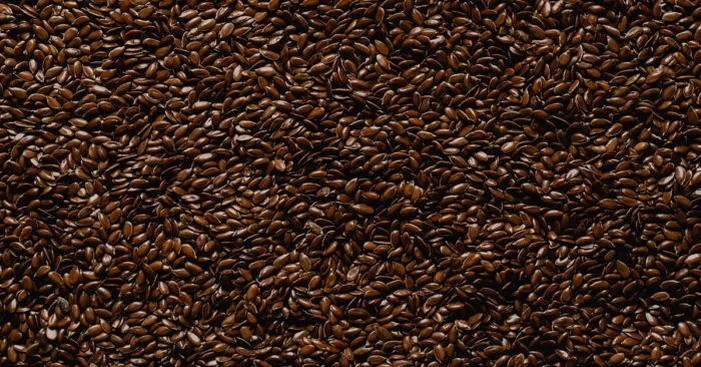
Generally, consuming flaxseeds is safe and doesn’t cause side effects.
However, including flaxseeds in the diet increases the activity of our intestines and digestive system.
Consequently, that may lead to:
- Bloating.
- Stomachache.
- Nausea.
- Diarrhea.
By increasing the number of flaxseeds in the diet those symptoms may increase as well.
Also, in rare cases of consuming large amounts of flaxseeds, they may lead to clogging in the defecation process.
This is due to fact that flaxseeds absorb a lot of water and turn into a gel form which enlarges the feces and makes it dry.
Because of that, it is best to soak flaxseeds in water for 20 minutes before consumption.
Also, we should drink a lot of water after we eat them to prevent dryness in the defecation process.
There are certain cases where caution is needed before consuming flaxseeds, including:
Diabetes:
Several scientific studies show the effectiveness of flaxseeds in lowering blood sugar levels.
Although this may be beneficial for patients with Hyperglycemia, it may be very dangerous for those with hypoglycemia.
This is why for diabetic people, it is best to ask the doctor before you eat flaxseeds.
Bleeding conditions:
Among the effect of flaxseed on our bodies is its ability to reduce blood clotting.
This is a good virtue but it may not be the case for people who suffer from bleeding disorders.
For these people and people with open wounds after surgery, it is advised to stay away from flaxseeds.
Intestinal problems:
Flaxseeds may be harmful to individuals who suffer from intestinal disorders or esophageal vomiting.
This is because of the rich fiber content in these seeds which affect the intestines.
High blood pressure:
People who suffer from high blood pressure (hypertension), they usually take drugs to reduce blood pressure.
The medicines’ effect combined with the effect of flaxseeds may lead to a sharp drop in blood pressure.
Low blood pressure:
Among the many virtues of flaxseeds is their ability to drop blood pressure.
However, for people suffering from low blood pressure (hypotension), it is very harmful as they drop blood pressure even further.
Flaxseed oil for hair:
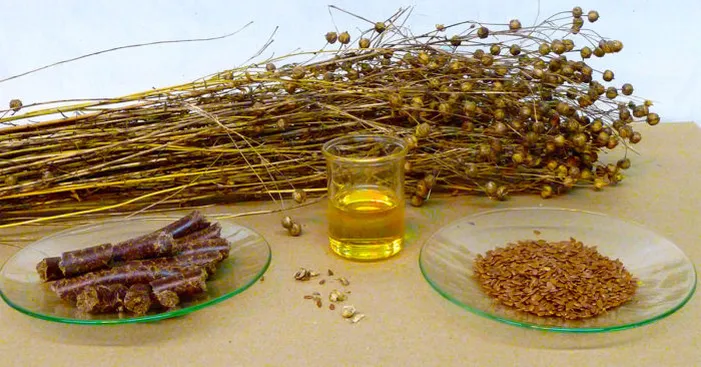
Flaxseed oil is basically just like you guessed, oil extracted from flaxseeds.
You can either find it in capsule or liquid forms that are rich in omega 3 fatty acids.
However, the oil extracted from flaxseed doesn’t contain the same nutrients in whole seeds but it is rich in beneficial alpha-linolenic fatty acid.
Benefits of flaxseed oil for hair:
With that composition, flaxseed oil is very beneficial for hair as it provides:
- A good amount of vitamin E: One of the most nutritious vitamins for hair as it provides antioxidant properties which prevent damage to the scalp and hair, boost blood circulation and prevent grayness.
- PH balancing: Using flaxseed oil help balance PH levels which calm the scalp and leads to balanced hair oil production.
- Good nutrition for hair follicles to make them healthier and less prone to damage.
- Smoothening and a natural solution to hair breakage, dryness, and frizz.
- A good treatment for hair loss, dandruff, and scalp eczema.
- Shininess and promote hair strength, scalp health, and cleanses it from fungus and microbes.
- A good solution for light hair as it promotes the germination of follicles.
Recipes of flaxseed oil for hair:
You can use flaxseed oil to make a hair mask that will penetrate the roots and provide good nutrition for your hair.
Flaxseed oil hair mask:
- Heat 2tbsp of flaxseed oil for a couple of seconds just to make it warm.
- Use the warm flaxseed oil on your hair and massage the scalp for 15 minutes.
- Cover your hair completely.
- Using a hot towel, wrap all of the hair.
- Use a hairdryer on the towel to heat it a bit more.
- Leave it on for 30 minutes.
- Then wash your hair using a sulfate-free shampoo.
- Repeat this flaxseed oil mask 3 times a week for optimal results.
Flaxseed oil to treat scalp problems:
- In a small bowl, mix 1tbsp of flaxseed oil, and 2tbsp of sugar, and a cup of water.
- Cover the bowl with plastic foil and let it rest for 30 minutes.
- Now pour the mixture into a spraying bottle.
- Use the mixture every time you shower by massaging your scalp and leaving it for half an hour before rinsing.
Flaxseed oil to promote hair growth:
- Chop onion then squeezes it or simply blend chopped onion to obtain its juice.
- In a small bowl, add 1tbsp of honey and 1tbsp of flaxseed oil to the onion juice and mix well.
- Apply the mixture to the scalp and make sure you distribute it evenly while massaging.
- Leave it for 30 minutes then rinse it.
- Repeat the process 3 times a week for optimal results.
Flaxseed oil to treat hair dryness:
- Get a cucumber and take all of its seeds then crush them into a thick paste.
- Add 1tbsp of flaxseed oil and 1 tbsp of sour cream to the cucumber seeds paste.
- Mix the ingredients together.
- Use the mixture as a hair mask and leave it for 30 minutes before rinsing.
Flaxseed oil to nurture the hair:
- Mix 1tbsp of flaxseed oil with 2tbsp of fresh lemon juice and 2 egg yolks.
- Apply the mixture to the hair and distribute it evenly.
- Wrap the hair with a hot towel then use a hairdryer on the towel to heat it even further.
- Leave the hair mask for 30 minutes then rinse it.
Flaxseed oil to moisturize hair:
- Mix a cup of water with 1tbsp of flaxseed oil, 1tbsp of sunflower oil, and few drops of glycerin.
- You can add few drops of lavender to get a good aroma.
- Pour the mixture into a spraying bottle and use it throughout the day to moisturize the hair.
Flaxseed oil to smoothen the hair:
- Mix 2tbsp of flaxseed with 1tbsp of grapefruit seed oil.
- Use the mixture on the scalp and make sure it reaches the roots and let it rest for 1 hour.
- Wash the hair with warm water and repeat the process 3 times a week for optimal results.
Flaxseed oil nutritional values for hair:
There are several reasons why flaxseed oil is super healthy for your hair.
Among those reasons, we mention the abundance of protein, fatty acids, omega-3, and folic acid.
Also, flaxseed oil contains many vitamins such as D, A, B2, B6, B9, and minerals such as calcium, iron, and potassium.
Buying flaxseeds:
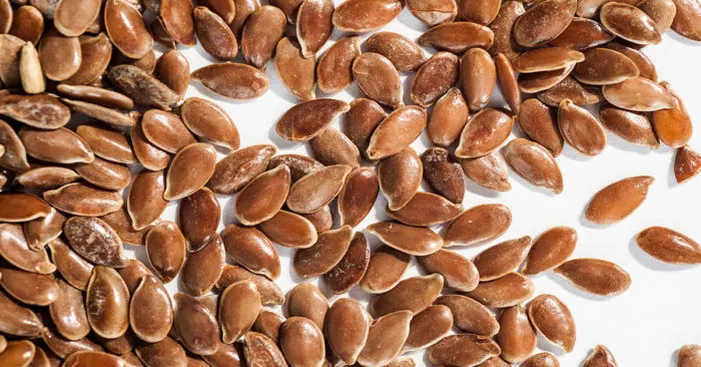
Flaxseeds are full of unsaturated oils which can oxidize if they are exposed to light and air.
The oxidation of flaxseeds oil makes these seeds prone to go rancid.
However, just like most other seeds, the first indicator of rancidity is the unpleasant smell.
When you buy milled flaxseeds or whole flaxseeds make sure you don’t smell any weird strong smell to ensure their freshness.
Even if you want to use grounded flaxseeds make sure you buy whole seeds and ground them at home.
To do that, you can easily use your coffee or spices grinder or any other grinder you own.
Make sure you store your ground flaxseeds in a dark place and away from the air.
Nonetheless, if you don’t have time or the means to grind flaxseed you can get them already grounded.
According to Dr. Linda Malcomson of the Canadian International Grains Institute: “It is safe to buy already grounded flaxseeds as long as they are in small quantities in a dark airtight bag”.
As for flaxseed oil, make sure it is yellow or light green with a strong fresh pleasant smell.
The oil is somewhat a little bit fluid and has almost the same texture as corn oil.
Whether you bought grounded flaxseeds, you ground them at home, or flaxseed oil, you should throw them away as soon as you start smelling a strong unpleasant smell.
Storing flaxseeds:
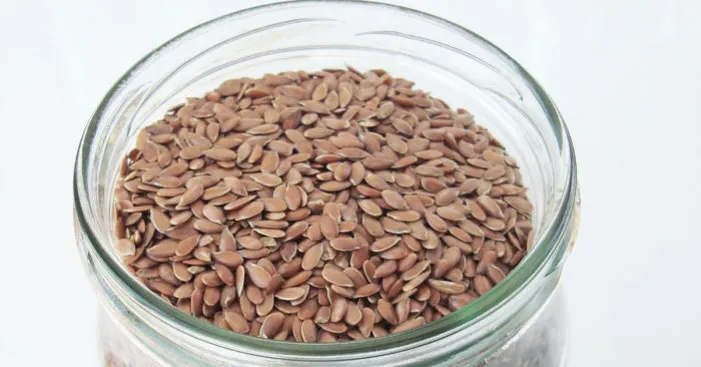
Storing whole flaxseeds:
The easiest and most effective way to store whole flaxseeds is to put them in a glass jar at room temperature.
However, don’t forget that flaxseeds are full of fatty acids which means they can go rancid.
Usually, there shouldn’t be a problem as long as you respect the consumption dates indicated.
The lifespan of whole flaxseeds can reach up to 1 year if stored properly in an airtight container.
Usually, people don’t consume whole flaxseeds as they only provide most of its health virtues when it’s consumed grounded.
Storing grounded flaxseed:
The most effective way to store grounded flaxseeds is by putting them in an airtight opaque container in the refrigerator.
If you have a vacuum preserving machine, just use a dark bag and you’re good to go.
However, to prevent any chance of your flaxseed powder going rancid, it is best to get whole flaxseeds and only ground them when you need them.
Flaxseed powder is the most effective way to consume them as it is easier to digest and ensures you get all of its nutrients.
Also, grounding flaxseeds make them super easy to use as you can basically add them to any recipe.
Storing flaxseed oil:
To store flaxseed oil the best way put it in a dark glass jar in the refrigerator.
Using that technique, you can preserve your flaxseed oil for up to 1 year.
However, once you opened the jar, it is best to consume it within the first 3 months before it gets rancid.
